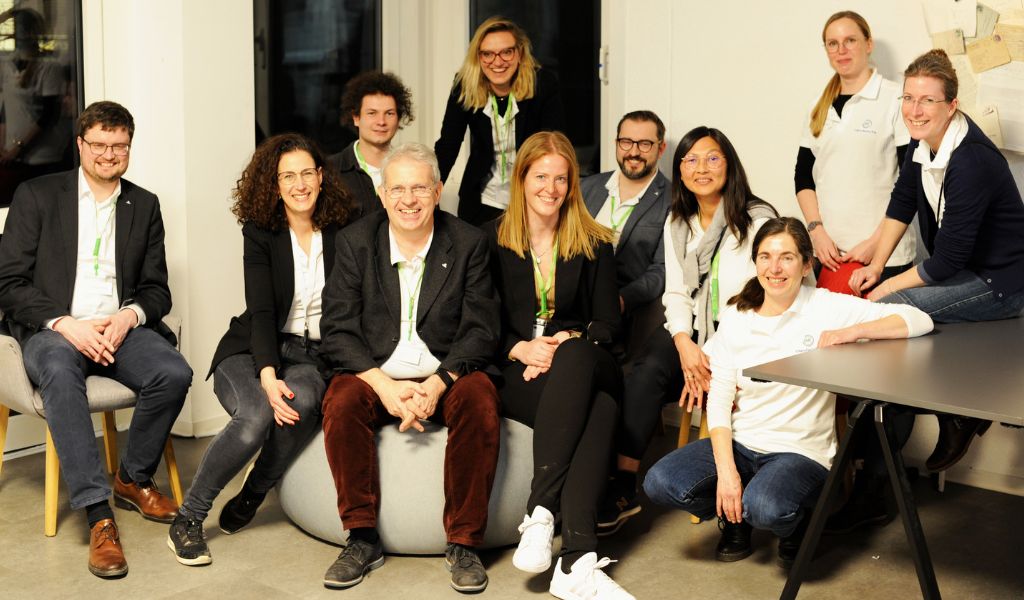Materials and process innovation for manufacturing
Resource efficiency in production is increasingly coming to the fore in view of high energy costs, availability of raw materials and securing supply of resources.
Therefore, innovations with a focus on circular economy and the use of new materials – from production to disposal – can strengthen the competitiveness of the manufacturing industry. In the demystification and matchmaking event “Material and process innovation for resource efficiency in production”, participants got ideas how companies could benefit from this and networked with potential partners to drive their ideas and solutions.

The event took place in HUB31, one of EIT Manufacturing Central’s network partners. The technology and start-up centre is located directy next to EIT Manufacturing Central in the same building.
Ten start-ups presented their solutions and use cases to the audience: Tvarit offers ready-to-use AI software solutions to the manufacturing industry, OndoSense helps avoid collisions between transport vehicles and humans with their high-precision radar sensors, SFM Systems digitises shopfloor management, Awesome Technologies offers robotics-as-a-service, ligenium designs and builds load carriers from renewable wood-based materials, Visometry uses augmented reality for quality assurance, Resourcify helps companies improve their waste management through a digital recycling platform, Senodis has developed solutions to mark and identify products even through harsh conditions, Circularise enables companies to move towards circularity by making global supply chains traceable via blockchain and FibreCoat has developed AluCoat, a material that bears the potential to become the most affordable material for electromagnetic shielding.

These presentations were flanked by two impulse talks: Before the solution presentations, Dr Thomas Hofmann from Fraunhofer ISC (Fraunhofer Institute for Silicate Research ISC) spoke about re-thinking materials as a strategy for the future and outlines four potential trains of thought in more detail: Simplification, design for recycling, recycling processes and functional materials as well supply chain management.
Mathias Kaldenhoff, Partner Sustainability & Innovation Management at SAP, provided food for thought after the use cases by addressing innovation cycles and characteristics of the industrial and scientific revolution. He presented a process and maturity level model for innovation management and engaged the audience in lively discussions – also by pointing out pitfalls for innovations.

Left: Dr. Thomas Hofmann, Fraunhofer ISC, right: Mathias Kaldenhoff, SAP.
The event was organised by EIT Manufacturing Central and EIT RawMaterials, both of them knowledge and innovation communities of the European Institute of Innovation and Technology (EIT), and supported by the Chamber of Commerce and Industry IHK Darmstadt Rhein Main Neckar.

The organising team from EIT Manufacturing and EIT RawMaterials after the event, while the participants were networking.
About EIT RawMaterials
Minerals, metals and advanced materials are important prerequisites for achieving the goals of the European Green Deal. Currently, only a fraction of the most relevant raw materials are sourced in Europe. This can be changed through circular economy and through innovations in recycling, substitution, processing, extraction and exploration. The aim of EIT RawMaterials is to secure a sustainable supply of raw materials across Europe by actively promoting innovation, education and entrepreneurship.
EIT RawMaterials provides a collaborative environment for disruptive and breakthrough innovation by connecting businesses with science, research and investment. EIT RawMaterials also invests in the future generation of innovators in the raw materials sector with initiatives ranging from student education to higher qualifications for industry professionals.
It is committed to supporting Europe’s transition to a circular, green and digital economy while strengthening its global competitiveness and safeguarding jobs. On this basis, EIT RawMaterials was commissioned by the European Commission to organise and lead the European Raw Materials Alliance (ERMA).

